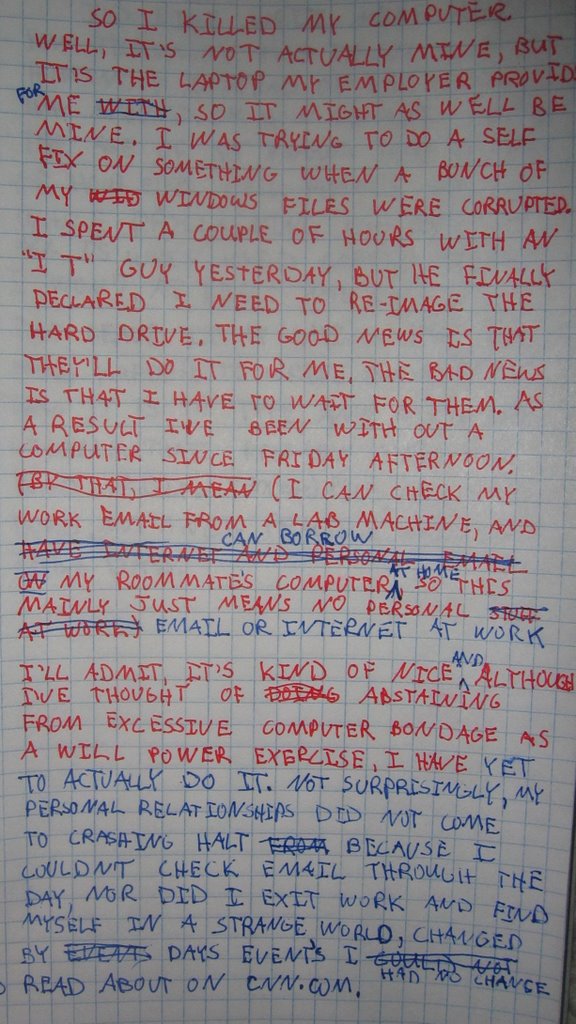It's about time
Ain’t Nothing on the Radio
Your thoughts betray you. You may claim to like the look of NPR, but your style is conservative all over.
You start out by slandering its name right off the bat, changing “Public” to “Propaganda.” Rush Limbough would be proud. Yet, by the end of the second paragraph you haven’t put in anything to support the clause. By the third paragraph you mention how “tax cuts have been proven” to have pulled the economy out of the drain, with out burdening us with that actual proof. I suppose, there’s no need if we had already decided to believe what ever you say.
If you listen to NPR as much as you claim, then you would realize that its place in the media is to tell a more balanced side to stories. If the government promotes a plan, then NPR will look into the other side of story. In this case, they looked at the other side of the tax story. When they did spend five minutes discussing the opposite side, at least they did broadcast a university professor compared to a homeless man off the street, which a conservative radio show would have used.
Personally, I listen to NPR just as much as I listen to conservative radio. The key to listening to all radio is to take in their points open minded, and then question what you here. If you listen only to agree, then not only are you not learning anything, but it’s safe to assume that you’re wrong.
America is a Drunken Sailor
Look at us wrong, and we’ll challenge everyone in the bar as to who wants a piece, standing in defiance to an unseen enemy, and yielding only after the guilty, the innocent, and ourselves are worse for the wear.
Do I believe that? No, but metaphors are interesting things. They allow you to go from point A to point B with out actually knowing the way, but by instead following a familiar path. This works great when some one else knows the connection between two ideas that you are unfamiliar with, and can use a metaphor to explain it to you in a familiar way – assuming that person does in fact know what they’re talking about. If they don’t, then you can be screwed pretty quickly. Imagine trying to get around Chicago with a map of New York. Some of the street names may be the same, and you may even get somewhere by accident, or convince yourself that you DO actually see the Statue of Liberty out in Lake Michigan. Metaphors are often used as a way to manipulate the masses by laying out an over simplistic path for them rally across, and actual bypass the real issue.
The enemy Within
I’m getting sick an tired of hearing the “Liberals like the terrorists” argument, along with the other coercive propagandous slander spewing forth from the right in an effort to maintain power, sidetrack the debate, and mislead the people. This includes “It’s unpatriotic to disagree with ________” (fill in the blank with what ever plan they’re currently pushing), and “If you’re not with us, you’re against us.” These are juvenile attempts to weaken critics standing before the debate actually begins. It’s dangerous to the country, and is the type of intimidation that shouldn’t make it past the grade school playground, and definitely not into the modern political arena.
Although I have heard some cries from the right regarding blame being placed on the US for its prior intervention in the middle east, I only take these cries with in the scope of future conflict avoidance, not as a solution to the current terrorist network. When you have a problem, the first step should always be resolution; you should not be concerned with assigning blame as to who caused it. When someone fucks up at work, the priority is to fix it. Wasting time blaming someone is counter productive. Afterwards, you can look at what caused the problem and work on making sure it doesn’t happen again. (Yelling at the person may or may not be part of this solution)
In the case at hand, the problem stated rather broadly is terrorism. Lots of crazy people want to blow up as much of our country as possible. Pretty serious problem. The first step is obviously to make sure they don’t do that. It’s reasonable to assume that killing some of them may be a regrettable but necessary part of that step. The second step is root causing, and future prevention. A very reasonable part of this step is to ask why these crazy people want to destroy us. Just saying “they’re crazy” doesn’t quite cut it. Anyone does not at least contemplate the possibility that the US did something to piss them off is being irresponsible.
Here’s a thought experiment to look at this. Imagine you walk up to an obviously disturbed mentally ill person on the street and punch them in the face. They in turn attack you. Is it a reasonable defense to just say they’re crazy, and have them hauled away while you walk away? I don’t think so, you’re obviously at some fault.
Ok, hold on; don’t get your Ronald Regan print under wear in a bind quite yet. I realized that’s a bit of an extreme example. Here’s a better way of laying out the same analogy that’s matches the current situation.
Imagine you’re walking down the street with a cup of coffee. While walking, you trip, and spill your drink all over a person next to you. He (or she) turns around, pulls a out a glock and shoots you. Did you provoke them? Yes. Was it by accident? Of course. Did their reaction in anyway match the provocation? No, not at all. Are they messed up and in need of getting their ass hauled away? Oh yeah. Regardless, you should WATCH WHERE YOU’RE FUCKING WALKING.
For those of you out there who have completely given up your ability of independent thought in favor of talk radio, the above example has you as the United States, the people on the street are the rest of the world, and the mental disable person you spilled coffee on is a terrorist.
Thank you for shopping at Wal-mart, please bend over to allow us to serve you better
I’m no fan of Wal-mart. I haven’t been for years. Those around me quickly learn this via tounge lashings handed out at the appearance of a plastic bag with that fucking smiling face on it. I do this not as an effort to sway opinions, but more as a way to open up discussion and see they HAVE an opinion. Most do not. They see Walm-mart just as what it appears on the surface, a dirt cheap, one stop warehouse convenience store. My foreign friends will comment on some of the negative aspects of American life, the mass consumerism, the superficiality, and the spread out cities, yet be in awe of a spectacular place like Wal-mart, without putting together the connection and dependency between them all. The more informed will be able to comment on how Wal-mart is a text book example of a modern supply chain in work. If you take any supply chain, or MIS classes, Wal-mart will always be praised as the benchmark of which to compare all others. That’s why they kicked the crap out of all the other crappy discount department stores. It has nothing to do with how they treat their employees; I’m sure you won’t find any employees that are better quality or paid more at K-Mart. They haven’t been doing anything different than any other stores haven’t been doing in the last fifty years, they’re just doing it better, plain and simple. They are the spitting image of the possibilities of capitalism.
There is a dark side to capitalism, however, that many of its proponents fail to acknowledge. The larger a company becomes the more money and power it obtains. The more money and power it has, the more opportunity it has to thwart the rules of capitalism. A large company can use money gained in one successful field to enter another field. This can be good, promoting competition, and increasing quality and price. At time though, a large company can instead try to use its position to eliminate the competition instead of competing with it. This goes against the ideas of what makes Capitalism all it is.
In the case of Walmart, I dislike their rural city business plan which requires them to remove all local competition.


